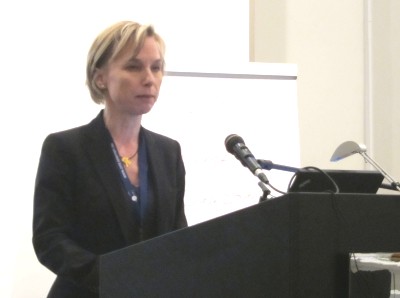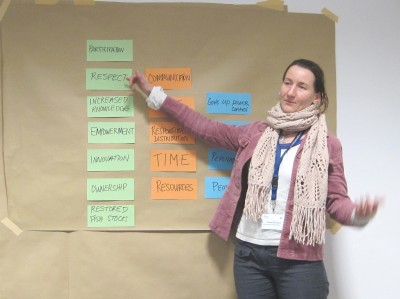A space for productive exchange and exploration of new science-society relations
 ZMT had invited an interesting range of speakers to share their reflections and experiences on the new ways in which sustainability science needs to engage with societal issues and actors.
ZMT had invited an interesting range of speakers to share their reflections and experiences on the new ways in which sustainability science needs to engage with societal issues and actors.
Listening to their quite different perspectives the research institutions' need became clearer to go well beyond the comfort zone of publishing results in the primary literature and seeking recognition from peers. A series of break-out sessions and other more interactive parts of the workshop created a space for self-reflection and search of pathways.
From the many issues identified by participants, a collective priority setting homed in on a few challenges considered particularly crucial to improve knowledge exchange and co-creation. An eminent panel then commented on these priority topics and engaged the audience in the debate. The panel was composed of Prof. Klaus Töpfer, Executive Director of the Institute for Advanced Sustainability Studies in Potsdam and former Executive Director of the UN Environment Programme in Nairobi, Dr. Hamady Diop, Director of Research and Innovation Systems of the West African Sub-Regional Fisheries Commission, and Alfred Schumm, Leader of the Global Fisheries Programme of WWF.
The growing numbers of not for profit knowledge institutions outside traditional universities and research institutes are a good indication for new needs critical engagement of scientists becoming stronger. The ZMT workshop offered a much needed exchange platform.
Several systemic features in the conventional science system provide powerful obstacles to sustainability science and its need to engage with all actors in society from the beginning of the knowledge production and sharing process. It starts with the need to produce researchable questions out of a dialogue process with others, including non-scientists, in the understanding that different perspectives often generate more interesting questions.
But recognition of such interactive research methods is not yet part of the career criteria and impact factor assessments. Learning to express research questions in a wider context and in understandable language to the many so as to facilitate testing and uptake is not yet part of basic study programmes. And research funders care primarily about publications in top journals, while research capacity building and outreach to groups in society, especially those outside “big business” are not prioritised.
 Yet, leading scientists of their day have taken great care to make their research understandable to the many. One of the inspiring role models is Sir Peter Medawar, the Nobel Prize winning biologist. "He was also awarded the 1987 Michael Faraday Prize "for the contribution his books had made in presenting to the public, and to scientists themselves, the intellectual nature and the essential humanity of pursuing science at the highest level and the part it played in our modern culture"." (quoted from Wikipedia).
Yet, leading scientists of their day have taken great care to make their research understandable to the many. One of the inspiring role models is Sir Peter Medawar, the Nobel Prize winning biologist. "He was also awarded the 1987 Michael Faraday Prize "for the contribution his books had made in presenting to the public, and to scientists themselves, the intellectual nature and the essential humanity of pursuing science at the highest level and the part it played in our modern culture"." (quoted from Wikipedia).
Today, there are more shining examples of how to reach out to citizens and also enrich the research process through systematic exposure to the “wisdom of crowds”. The workshop was one more step on the long road to mainstreaming this way of doing science.
The workshop programme is available here. More information about ZMT is available on its website. The Bremen Criteria on international cooperation are here.








